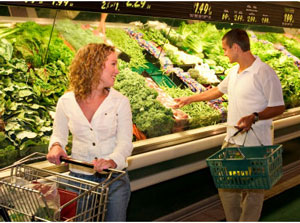 I have been undergoing treatment for acid reflux for about two months, with the guidance of Dr. Jamie Koufman, one of the authors of Dropping Acid: The Reflux Diet Cookbook & Cure. Like many people who suffer from heartburn, I had a pretty clear idea of my worst trigger foods before seeking medical attention. Coffee, citrus, alcohol and tomato sauce all had me reaching for the Tums.
I have been undergoing treatment for acid reflux for about two months, with the guidance of Dr. Jamie Koufman, one of the authors of Dropping Acid: The Reflux Diet Cookbook & Cure. Like many people who suffer from heartburn, I had a pretty clear idea of my worst trigger foods before seeking medical attention. Coffee, citrus, alcohol and tomato sauce all had me reaching for the Tums.
What I learned from Dr. Koufman is that acid as a food additive is also a contributor to reflux. Acid is added to foods because it prevents the growth of bacteria, but few consumers are aware of the potentially negative consequences of this practice. Things containing ascorbic acid, citric acid, and acetic acid should all be avoided by people suffering from reflux. You should also look out for foods and beverages that are “vitamin C enriched” or “vitamin C enhanced,” which is usually done through the addition of citric acid.
Added acid will always appear on the ingredients list. “In the beginning, think like you are learning a new language,” says Dr. Koufman. “You need to start looking at labels and you should know which foods are unacceptable based upon the acidity and fat content.” Food high in fat should also be avoided if you have reflux, because fat stays in the stomach longer and can increase pressure. It’s best to buy organic poultry, because it will have a lower fat content.
Once you start examining labels you will find that many, many processed foods have added acid, from candy and soups to frozen dinners and juices. This may seem daunting at first, but the best thing for people with reflux is to follow the familiar advice of shopping at the edges of the grocery store. This means buying mostly whole foods, particularly veggies, lean meats and low-fat dairy products. Of course, you will still need to avoid citrus and tomatoes, plus whatever foods are triggers for you. Some foods, like yogurt, garlic and onions, are triggers for some but not everyone.
Buying more whole foods does generally mean cooking more at home, but there are still a number of healthy and convenient options for days that are too busy for cooking. “I am always buying bananas, and nowadays every Bodega has bananas,” says Dr. Koufman. Sandwiches are a convenient option that can also be purchased ready-made. “My go-to sandwich has always been turkey breast, preferably organic turkey. If there is something in the sandwich, like excessive amounts of mayonnaise, I get a plastic knife and take it off.” She adds that small amounts of fats are OK. Eating a low-fat, low-acid diet has the added benefit of being heart-healthy.
To give you a little more concrete idea of some foods that won’t cause acid reflux, below is my typical grocery list for the week.
Margaret’s Acid Friendly Shopping List:
- Romaine lettuce
- Potatoes
- Parsnips
- Spinach or kale
- Squash
- Mushrooms
- Carrots
- Corn
- Peas
- Celery
- Basil
- Cilantro
- Salmon
- Chicken breast
- Skim milk
- Whole grain bread
- Chamomile tea
- Bananas
- Honey
- Ginger
- Pears
- Beans
- Lentils
- Brown Rice
- Pasta
- Oatmeal
There are certainly other foods that are fine for reflux, this is just a sample list. If you have any questions about specific items, just leave a comment.
Also Read:

Hi Maggie,
I was just wondering if lactic acid (plant based) was also bad for you? I have severe acid reflux.